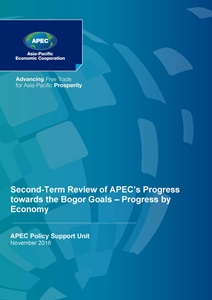Second-Term Review of APEC's Progress towards the Bogor Goals - Progress by Economy

| Published Date | November 2016 |
|---|---|
| Type of Publication | Reports |
| Publication Under | APEC Secretariat, APEC Policy Support Unit |
| Accessed | 12388 |
| Pages | 88 |
| Download publication | Download |
Description
The analysis by individual economy highlighted their recent progress and identifying areas in which economies could make further improvements. These reports by economy were prepared with information from their Individual Action Plans and data from other sources such as international organizations and domestic government institutions. Among the most important findings:
- MFN tariffs for non-agricultural and agricultural products declined, but MFN tariffs for agricultural products are still much higher
- New NTMs have been imposed in recent years. Prohibitions and restrictions tend to be specific to certain products
- Mixed reviews in services sectors across the APEC region. While many economies are using RTA/FTAs and unilateral measures to relax restrictions on foreign companies in some services sectors; other economies have increased those restrictions.
- Efforts to improve investment conditions by relaxing ownership conditions, raising investment screening thresholds, lowering taxes or signing investment protection or avoidance of double taxation agreements. Investment restrictions remain in sectors considered as strategic.
- Active participation in international standardization activities and efforts to align domestic to international standards
- APEC economies are implementing the WTO Trade Facilitation Agreement. Single windows continue their modernization and trusted operator programs, such as AEOs, are being implemented or expanded.
- Reforms to enhance environment to support intellectual property rights. Efforts to speed up the examination of applications for patents, registration of trademarks, etc. Border measures getting strengthen to detect intellectual property rights infringements.
- Reforms to promote more competition and deter anticompetitive practices
- Government procurement preferences to benefit local businesses are still used in many APEC economies. Many APEC members have implemented the WTO Government Procurement Agreement or negotiating their accession
- Validity of APEC Business Travel Card extended to 5 years. More expedite secure travel/automatic clearance programs for selected travelers.
- Network of RTA/FTAs is expanding
- MFN tariffs for non-agricultural and agricultural products declined, but MFN tariffs for agricultural products are still much higher
- New NTMs have been imposed in recent years. Prohibitions and restrictions tend to be specific to certain products
- Mixed reviews in services sectors across the APEC region. While many economies are using RTA/FTAs and unilateral measures to relax restrictions on foreign companies in some services sectors; other economies have increased those restrictions.
- Efforts to improve investment conditions by relaxing ownership conditions, raising investment screening thresholds, lowering taxes or signing investment protection or avoidance of double taxation agreements. Investment restrictions remain in sectors considered as strategic.
- Active participation in international standardization activities and efforts to align domestic to international standards
- APEC economies are implementing the WTO Trade Facilitation Agreement. Single windows continue their modernization and trusted operator programs, such as AEOs, are being implemented or expanded.
- Reforms to enhance environment to support intellectual property rights. Efforts to speed up the examination of applications for patents, registration of trademarks, etc. Border measures getting strengthen to detect intellectual property rights infringements.
- Reforms to promote more competition and deter anticompetitive practices
- Government procurement preferences to benefit local businesses are still used in many APEC economies. Many APEC members have implemented the WTO Government Procurement Agreement or negotiating their accession
- Validity of APEC Business Travel Card extended to 5 years. More expedite secure travel/automatic clearance programs for selected travelers.
- Network of RTA/FTAs is expanding

